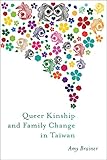Queer Kinship and Family Change in Taiwan / Amy Brainer.
Material type: TextSeries: Families in FocusPublisher: New Brunswick, NJ : Rutgers University Press, [2019]Copyright date: ©2019Description: 1 online resource (194 p.) : 2Content type:
TextSeries: Families in FocusPublisher: New Brunswick, NJ : Rutgers University Press, [2019]Copyright date: ©2019Description: 1 online resource (194 p.) : 2Content type: - 9780813597607
- 9780813597645
- 306.7608350951249 23
- HQ77.95.T28 B73 2019eb
- online - DeGruyter
- Issued also in print.
| Item type | Current library | Call number | URL | Status | Notes | Barcode | |
|---|---|---|---|---|---|---|---|
 eBook
eBook
|
Biblioteca "Angelicum" Pont. Univ. S.Tommaso d'Aquino Nuvola online | online - DeGruyter (Browse shelf(Opens below)) | Online access | Not for loan (Accesso limitato) | Accesso per gli utenti autorizzati / Access for authorized users | (dgr)9780813597645 |
Frontmatter -- Contents -- 1. Introduction: Bringing Families of Origin into Focus -- 2. Meanings of Silence and Disclosure -- 3. (Queerly) Carrying on the Family -- 4. Gender and Power across Generations -- 5. Strategic Normativity: Sex, Politics, and Parents -- 6. Siblings and Family Work -- Conclusion -- Appendix A: Naming and Language -- Appendix B: Interviewees -- Acknowledgments -- Notes -- Index -- About the Author
restricted access online access with authorization star
http://purl.org/coar/access_right/c_16ec
Interweaving the narratives of multiple family members, including parents and siblings of her queer and trans informants, Amy Brainer analyzes the strategies that families use to navigate their internal differences. In Queer Kinship and Family Change in Taiwan, Brainer looks across generational cohorts for clues about how larger social, cultural, and political shifts have materialized in people's everyday lives. Her findings bring light to new parenting and family discourses and enduring inequalities that shape the experiences of queer and heterosexual kin alike. Brainer's research takes her from political marches and support group meetings to family dinner tables in cities and small towns across Taiwan. She speaks with parents and siblings who vary in whether and to what extent they have made peace with having a queer or transgender family member, and queer and trans people who vary in what they hope for and expect from their families of origin. Across these diverse life stories, Brainer uses a feminist materialist framework to illuminate struggles for personal and sexual autonomy in the intimate context of family and home.
Issued also in print.
Mode of access: Internet via World Wide Web.
In English.
Description based on online resource; title from PDF title page (publisher's Web site, viewed 21. Jun 2021)


